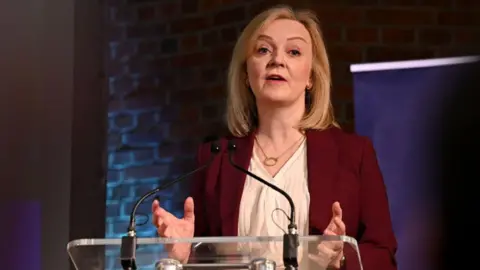Truss legal threat to PM over claim she crashed economy
 Getty Images
Getty ImagesFormer Prime Minister Liz Truss has sent a legal "cease and desist" letter to Sir Keir Starmer demanding he stop saying she "crashed the economy".
Her lawyers argue the claim made repeatedly by Sir Keir is "false and defamatory", and harmed her politically in the run-up to losing her South West Norfolk seat in the general election.
Truss was the UK's shortest-serving PM, forced to resign after just 49 days in office when borrowing costs soared in the aftermath of her government's mini-budget.
The prime minister's spokesman suggested Truss should also write to "millions of people up and down the country" who, he said, had seen their mortgage bills pushed up by her economic policies.
Sir Keir "absolutely stands by" his language about the previous government's record, the spokesman told reporters.
Responding on X, Truss said: "I know Keir Starmer won't repeat his allegations that I crashed the economy because he knows it's a lie."
Earlier, Commons leader Lucy Powell told MPs "we won't cease and desist from telling the truth that they [the Conservatives] crashed the economy".
Also speaking in the Commons, Chief Secretary to the Treasury Darren Jones said the previous Conservative government had "ruined the lives of people across this country" through their "hubris" and "recklessness".
It comes as the pound fell to its lowest level in over a year and government borrowing costs have surged to their highest level in 16 years.
Economists have warned these rising costs could force further tax rises or cuts in spending as the government tries to meet its self-imposed rule not to borrow to fund day-to-day spending.
Responding to an urgent question in the Commons, Jones insisted there was "no need for an emergency intervention" in financial markets.
Movements in borrowing costs were being driven by "a wide range of international and domestic factors," he said.
Tory shadow chancellor Mel Stride said Labour's tax rises would be "swallowed up by the higher borrowing costs at no benefit to the British people".
A "cease and desist" letter usually represents a warning that the recipient will face legal action if they continue the allegedly unlawful activity.
In the letter sent to Sir Keir on Thursday, Truss's lawyers say his statements about their client are "false and misleading".
"Their publication is not only extremely damaging but also grossly defamatory and indefensible... It would be hard to avoid a conclusion that they were made maliciously," the letter adds.
Truss's lawyers say they are seeking "an amicable basis on which you will agree to cease repetition of what is clearly a factually incorrect and defamatory statement about our client.
"This request is made in the context of the basic levels of civility which is due between senior politicians, and we trust that you will respond accordingly."
The letter argues that the movements in financial markets during Truss's tenure in No 10 should not be classified as an economic crash.
The weeks following the mini-budget delivered by Truss's chancellor Kwasi Kwarteng in September 2022, which included wide-ranging tax cuts, saw sharply adverse market reaction, and mortgage costs soared.
But in a video posted on X after Downing Street's comments, Truss said Labour, the Bank of England and "the media establishment smeared my budget and forced a reversal".
"Now, they've plunged the country into economic crisis," she added.
During the Conservative Party conference last October, the former prime minister said it would be "economic illiteracy" to suggest that tax rises from Labour - at that point anticipated in Rachel Reeves' upcoming first Budget - were a result of her economic inheritance.
Last July, shortly after Labour took office, civil servants changed documents describing the mini-budget as "disastrous" after she complained they showed "flagrant" political bias.
Briefing notes on the King's Speech, which sets out the government's programme of new laws - published earlier on the government website - said the former PM's approach had damaged the UK's financial credibility.
The Cabinet Office said the documents had been "corrected and updated".
